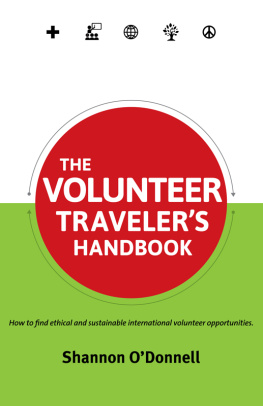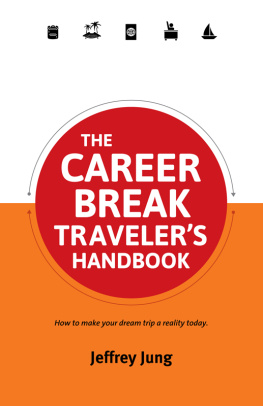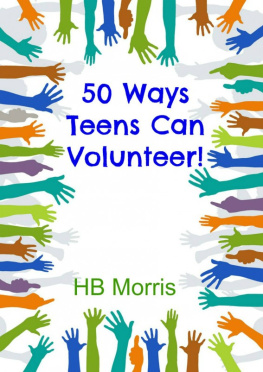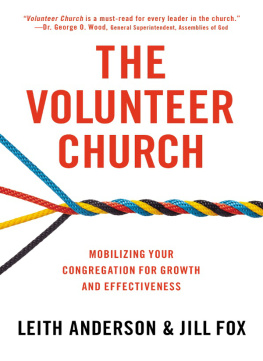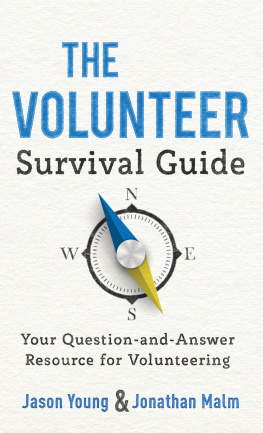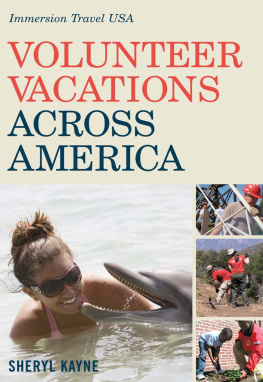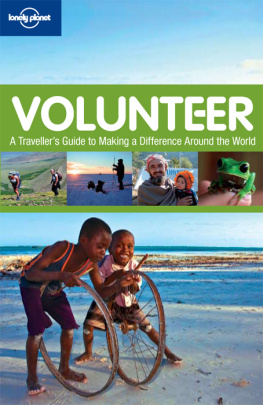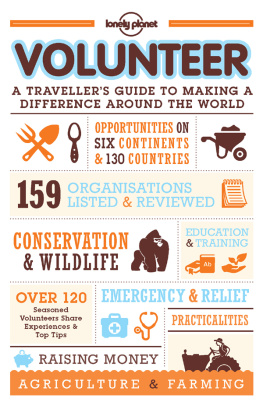
Disclaimer:
This book provides entertaining and informative snapshots of the writer's personal experiences and helpful tips from the writer and others, learned while volunteering and traveling around the world. The tips provided in this book are not meant to serve as an exclusive checklist to effectively safeguard the reader in every travel situation. Each reader should complete updated, detailed research from legitimate sources to learn the cultural norms and safety recommendations for their specific destination. No one can guarantee safety and travel can expose everyone to potential risks. Because safety is impacted by each persons actions and choices, each reader is advised to always do their homework on their destination and use their best judgment while on their journey.
I wish you safe, happy and fulfilling travels.
To the people I met at each stage of my travels,
and in each place I volunteered.
For your stories.
For your lessons.
Simply, thank you.
Acknowledgements
Much a testament to the nature of travel, throughout the months writing this book, it slowly came to life as I traveled in Thailand, Burma, and Cambodia. The book was then fine-tuned in Florida, Oregon, Washington, and Virginia. And if the eclectic collection of places is any indication of the thanks due, there are many people who helped shape the ideas and stories within.
A thank you to my dad for his support of my ongoing travels, and to both my parents for the welcoming hugs each time I return home. And to my niece Ana, thank you for bringing light and joy to our trip together. Friends often bridge the gap into family; heartfelt thanks to: Stephanie, Niki, Niki, Jenn, J. J. and Joanne.
And thank you to the travelers who have impacted my life in ways too numerous to count. Jodi, you are a sister from a past life; thank you for your friendship and sage advice every step of the way. Dan and Audrey, your feedback was both timely and invaluablethank you. And to Dani and Jess, a thanks for your friendship and your help with my niece Ana while I drafted this book in Cambodia.
Thanks to each volunteer and traveler who shared a story in this book. And a final thank you to Janice Waugh, I appreciate your guidance and support and for the chance to share my stories as a part of this series.
Contents
The Backstory
Throughout my college years, I was motivated to tackle life with a rosy idealism and sincere commitment to serve my community. I joined almost any volunteer project that crossed my path. I raised funds annually for the American Cancer Society, served breakfast to the homeless in my city, and volunteered at my local animal shelter. The opportunities were there, and I had the time and desire to serve.
Fast-forward to my post-university life, however, and somehow I found myself bogged down with personal daily dramas that preoccupied my days. I moved from my home state of Florida to Los Angeles, California after graduation and I lost all my focus on service and volunteering. And, though only partly correlated, I found myself less happy with life in general.
In 2008, after two years in Los Angeles, I felt an urge to change my life to embrace a dream I had always nurtured but had never expressed. I decided to pack up my life and travel around the world for a year.
But this time I wouldnt lose my focus. I would volunteer. I would bring serving others back into my life. Not as my primary focus, but rather as a regular complement to how I live and travel. With that in mind, I promised myself I would find and work on service-based projects whenever the opportunity presented itself as I traveled.
Over the course of my one-year trip, word of mouth brought me to a well-run orphanage on the outskirts of Phnom Penh, Cambodia. The orphanage was filled with motivated, bright students in a loving environment where all their needs were being met.
My sense of fairness took me to restaurants and shops operating with a social mission: a caf using money to train street kids, a restaurant-cum-school teaching the local refugee community the languages and skills they needed to excel outside their home country.
In 2009, my love of children brought me to a monastery in Pharping, Nepal, where I taught English language classes for 46 young monks in a small town one hour outside of Kathmandu. That month impacted my life in many waysand likely more than my time impacted any of those children.
I found the monastery through a middleman organizationa placement company that matches volunteers with projects for a fee. That side of my volunteer experience tanked for many reasons. What it boils down to, and the main lesson that I learned, was that I didnt ask the right questions. I didnt ask where my placement fee was going, and didnt know enough at the time to really make sure that the middlemen had the best interests of the community at the heart of their work.
I feel incredibly fortunate that the issues with the placement organization did not prevent me from working with my students. No, that part was fantastic. But the sum of the experience opened my eyes to another side of the volunteering industry that I, in my naivet, had never considered.
With that experience to fuel me over the next three years as I continued traveling, I worked on my passion project: a community-sourced database of independent volunteer opportunities, philanthropic businesses, and social enterprises located all over the world. It took years to crystallize the idea. And as I formed the site GrassrootsVolunteering.org, it occurred to me that more was needed. That beyond the database, there was an entire side of volunteering abroad that I hadnt understood until I spent years on the road talking to people, organizations, and other volunteers.
The Volunteer Travelers Handbook is my beyond. Its the other side of the volunteer industry that every volunteer and socially responsible traveler should understand. Its the missing pieces, the questions you never thought to ask. Travelers of any age, any background, and any travel style can find a way to give back to the communities they visit. But how travelers give back can vary greatly. It can mean using fair-trade retail shops, restaurants, and spas in a new city. It can mean reducing the negative environmental footprint of travel by participating in conservation projects. And it definitely means understanding the ethical side of the volunteering industry so volunteers can pick projects and opportunities fit for both the local community and the volunteers goals.
My purpose in writing this handbook started as a seed of an idea in 2009 when I taught in Nepal. I wasnt aware of the social and community impact my volunteer choices made back then, and my sole goal is to give you, the traveler, the tools you need to make positive choices as you travel the world.


Projects and Learning with Children in Cambodia
A slow whirling ceiling fan circulated the lazy, heat-drenched air as my friend Laura and I prepared our lesson plans. I had arrived at the Future Light Orphanage (FLO) in Phnom Penh, Cambodia just one week prior, and I had spent the week reading with children in the library and assisting the teachers in the orphanages development skills classes.
Images from TV commercials that I had seen while growing up in the United States had given me all sorts of preconceptions about Cambodia, ideas that I took into my travels and volunteering in the country. But each day volunteering at FLO provided experiences that defied these stereotypes. Though many children were, in fact, orphans, they were far from destitute and lonely. The orphanage was run more like a boarding school; each child attended the local public school full-time while attending additional skills development classes hosted by FLO.
Next page
